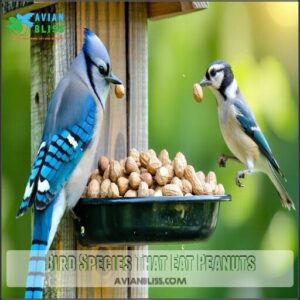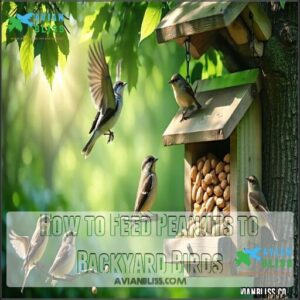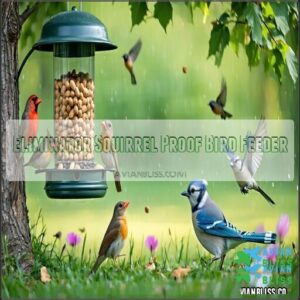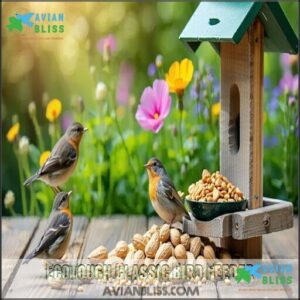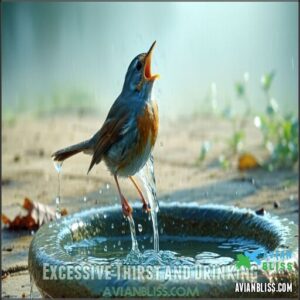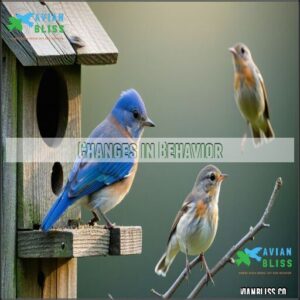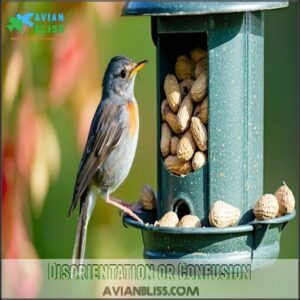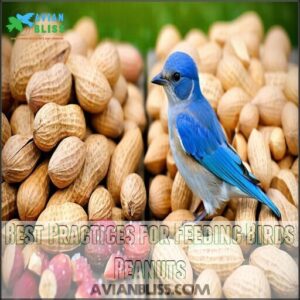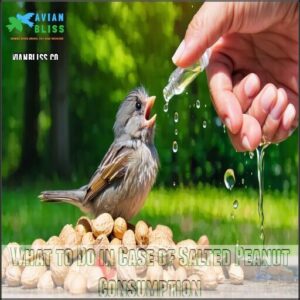This site is supported by our readers. We may earn a commission, at no cost to you, if you purchase through links.
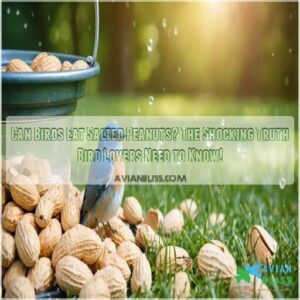
Their bodies are small and can’t handle excess sodium like ours can.
Salted peanuts might taste great to us, but for birds, it’s a recipe for dehydration, kidney issues, or worse.
If you’re offering snacks to your feathered friends, stick to unsalted peanuts—preferably raw or roasted without any added flavor.
These provide a safe, healthy treat packed with nutrients birds love.
Plus, you’ll avoid the risk of accidentally causing harm.
Keep it simple, and your backyard visitors will thank you with cheerful chirps and flutters, enjoying the healthy treats you provide.
Table Of Contents
- Key Takeaways
- Can Birds Eat Salted Peanuts?
- Safe and Healthy Alternatives to Salted Peanuts
- Bird Species That Eat Peanuts
- How to Feed Peanuts to Backyard Birds
- Squirrel-Proof Bird Feeders for Peanuts
- Signs of Salt Poisoning in Birds
- Best Practices for Feeding Birds Peanuts
- What to Do in Case of Salted Peanut Consumption
- Frequently Asked Questions (FAQs)
- Can birds eat salted peanuts?
- Do parrots eat peanuts?
- Can birds eat shelled peanuts?
- Are peanuts safe for birds?
- Can baby birds eat peanuts?
- Can I use unsalted roasted peanuts in my bird feeders?
- Are salted peanuts bad for birds and squirrels?
- Is it safe for birds to eat peanuts?
- Are salted peanuts okay for birds?
- Will salted nuts hurt birds or squirrels?
- Conclusion
Key Takeaways
- Don’t feed birds salted peanuts—they can’t handle salt and it harms their kidneys, causing dehydration or even death.
- Always choose unsalted peanuts, either raw or roasted, as a safe and healthy option for birds.
- Keep peanuts fresh by storing them in airtight containers and offering them in moderation to avoid spoilage and overfeeding.
- Watch for signs of salt poisoning like excessive thirst, lethargy, and disorientation, and provide fresh water immediately if it happens.
Can Birds Eat Salted Peanuts?
You shouldn’t feed birds salted peanuts because salt is toxic to birds and can damage their kidneys, leading to dehydration and possibly death.
Salted peanuts can harm birds’ kidneys, causing dehydration or death—unsalted options ensure their health and safety.
Birds can’t process salt efficiently like humans can, and even small amounts of salt can cause serious health problems for their small bodies.
Risks of Salted Peanuts for Birds
Salted peanuts pose serious dangers to birds, potentially leading to fatal consequences.
Birds can’t process salt like humans can:
- Salt toxicity can cause kidney failure within hours of consumption
- Excessive salt intake triggers severe dehydration risks and electrolyte imbalance
- Even small amounts can disrupt a bird’s natural salt tolerance
Never offer salted peanuts to birds. Their tiny bodies can’t handle the high sodium content, making it a potentially deadly treat. Instead, consider offering them unsalted sunflower seeds, a much safer alternative, to ensure the well-being of the birds and provide a safer choice.
Effects of Salt on Bird Health
Your feathered friends have delicate systems that can’t process salt like humans do. Birds lack efficient salt-excreting mechanisms, making salt poisoning a serious concern.
Birds have delicate systems that can’t handle salt, making even small amounts a serious threat to their health and well-being.
Here’s what happens when birds consume excess salt:
- Dehydration risks increase dramatically as birds struggle to eliminate salt through limited kidney function
- Electrolyte imbalance disrupts nervous system function, causing disorientation and weakness
- Bird renal failure can occur rapidly, as toxic levels overwhelm their small bodies
Even small amounts of salt intake from salted peanuts can trigger these bird health risks. Their low salt tolerance means what’s merely tasty for us can be deadly for them.
Alternatives to Salted Peanuts
Since salt can harm our bird friends, let’s look at safe alternatives to keep them healthy and thriving.
| Safe Alternative | Benefits | Bird Appeal | Ease of Use | Availability |
|---|---|---|---|---|
| Sunflower seeds | High fat, protein | Very high | Easy | Widely available |
| Safflower seeds | Low salt, high energy | Medium | Easy | Most stores |
| Nyjer seeds | Attracts finches | High | Special feeder | Specialty shops |
| Suet cakes | Winter energy | Very high | Cage required | Seasonal |
| Mealworms | Protein-rich | Extremely high | Messy | Limited |
Unsalted peanuts offer birds the energy they need without harmful sodium. Raw, unsalted varieties provide excellent nutrition while roasted unsalted peanuts are easier for smaller birds to digest.
For variety, mix in bird feeding tips like offering fresh fruits or berries occasionally. Remember that proper safe bird food choices help prevent bird health risks. Birds have very low bird salt tolerance, so stick with specially formulated options to avoid unnecessary bird food dangers.
Safe and Healthy Alternatives to Salted Peanuts
You can keep your feathered visitors healthy by offering unsalted raw or roasted peanuts that provide essential protein and fats without the dangerous sodium content.
These safer alternatives support birds’ growth and energy needs during all seasons, especially when offered alongside other nutritious options like sunflower seeds.
Unsalted Raw Peanuts for Birds
After learning about the dangers of salted peanuts, you’ll be pleased to know that raw unsalted peanuts offer a safe, nutritious alternative for your backyard birds.
Raw peanuts provide excellent nutritional value with high protein content that helps birds maintain energy, especially during colder months. When selecting raw peanuts, choose Valencia or runner varieties as they undergo careful processing to minimize aflatoxin concerns. You can find various options available to suit your birds’ preferences.
- Your birds will chirp with delight when discovering these protein-packed treats
- You’ll smile watching chickadees and woodpeckers enthusiastically visit your yard
- Your feeding station will become a vibrant hub of natural bird activity
- You’ll feel good knowing you’re supporting their health naturally
Store raw peanuts in airtight containers in cool, dry places to prevent mold growth. Offer them in mesh feeders that allow proper airflow while providing easy access for birds of various sizes.
Remember to serve in moderation – raw peanuts should complement, not replace, a varied bird diet.
Unsalted Roasted Peanuts for Birds
Unsalted roasted peanuts offer excellent nutritional value for your backyard birds. The roasting benefits include reduced risk of harmful aflatoxins while preserving protein content essential for bird health.
Many birds prefer the enhanced flavor of properly roasted peanuts. For safe preparation, choose plain, unsalted varieties without oils or seasonings.
Spanish and Valencia peanuts work well due to their different sizes that accommodate various bird preferences. Store peanuts in airtight containers to prevent mold growth.
Always check for spoilage before bird feeding. Remember moderation in peanut offerings—a small handful daily provides energy without compromising balanced bird nutrition.
You can easily find these peanut products online.
Other Bird-Friendly Foods
Beyond unsalted peanuts, your backyard birds will appreciate a varied menu of nutritious alternatives.
Wild bird nutrition improves when you offer a diverse bird diet featuring several food types.
Add these bird-friendly options to your feeders:
- Black oil sunflower seeds – high in fat and easy to crack, perfect for chickadees and cardinals
- Safflower seed – loved by cardinals while squirrels typically avoid it
- Nyjer seeds – tiny seeds that goldfinches and siskins can’t resist
- Suet cakes – energy-rich treats that woodpeckers, nuthatches, and chickadees will visit regularly
Fresh berries like blueberries and raspberries make excellent treats, especially during nesting season.
Mealworms provide essential protein that parent birds need when feeding their young.
During winter months, the best bird seeds are those with high fat content to help birds maintain body heat.
Many bird enthusiasts buy high quality seeds for their feeders.
Remember to provide fresh water daily alongside these nutritious offerings.
Bird Species That Eat Peanuts
You’ll find a variety of birds visiting your feeders for peanuts, including woodpeckers, jays, chickadees, nuthatches, and titmice.
These species have adapted to handling different forms of peanuts, with larger birds like blue jays preferring peanuts in shells while smaller birds such as chickadees and nuthatches find shelled peanuts easier to eat, which is a notable adaptation to their peanuts preferences.
Woodpeckers and Nuthatches Eating Peanuts
While unsalted peanuts make excellent alternatives for birds, woodpeckers and nuthatches show particular enthusiasm for this protein-rich treat. You’ll notice these birds approach peanuts with distinctive feeding techniques.
Woodpeckers prefer larger peanut sizes they can work with their strong bills, often using unique shelling methods to extract the nutritious kernels. Nuthatches typically grab peanuts and wedge them into tree bark before pecking them open.
Remember, never offer salted peanuts as they pose serious bird health risks. Both woodpeckers and nuthatches will visit your feeders more frequently when you provide appropriately sized, fresh unsalted options.
Jays and Chickadees Eating Peanuts
Four bird species from the jay family particularly enjoy peanuts, while chickadees approach them with distinct techniques.
Both demonstrate remarkable intelligence in their feeding habits.
When feeding these birds peanuts, consider:
- Jay preferences include whole peanuts they can shell themselves
- Chickadee techniques involve quick grab-and-go feeding styles
- Shelling peanuts helps smaller chickadees access the nutrition
- Peanut size matters – jays handle larger nuts while chickadees prefer smaller pieces
- Feeding frequency should remain consistent as these birds remember reliable food sources
Never offer salted peanuts, as they’re harmful to backyard birds, and ensure to provide them with a consistent feeding schedule to maintain their trust.
Other Bird Species That Eat Peanuts
Your peanut feeder can attract an impressive mix of bird species, each with unique preferences.
Northern Cardinals, Wrens, Sparrows, and Juncos enjoy shelled peanuts, while larger birds like Crows and Ravens handle whole ones with ease.
Blue Jays stash multiple peanuts, while Nuthatches and Woodpeckers prefer shelled bits for quick snacking.
Smaller backyard birds benefit from shelled peanuts, which are easier to digest, and offering a variety of peanut sizes guarantees a diet variety, supporting bird digestion and keeping your backyard birds healthy and happy.
How to Feed Peanuts to Backyard Birds
You’ll need to provide unsalted peanuts to your backyard birds using appropriate feeders placed in safe, accessible locations.
Regular monitoring and cleaning of feeding areas helps prevent mold growth and guarantees your feathered visitors receive proper nutrition without harmful salt content, which is crucial for their well-being with proper nutrition.
Feeder Selection for Peanuts
After seeing which birds enjoy peanuts, let’s look at how to serve them safely with the right feeders.
Choosing the perfect feeder for peanuts helps keep your backyard birds safe while enjoying their protein-rich snack. Weather protection is essential when selecting feeders to prevent mold growth on peanuts.
Here are ideal feeder options for serving unsalted peanuts:
- Metal mesh feeders – Durable and perfect for shelled peanuts
- Wreath-style feeders – Allow birds to pull nuts through openings
- Tray feeders with drainage – Support ground feeding for juncos and doves
- Tube feeders with squirrel baffles – Keep peanuts secure from hungry mammals.
Look for feeders with easy-clean designs and weather-resistant materials for proper hygiene.
Consider feeder placement strategies to optimize bird safety.
Feeder Placement and Maintenance
For the best bird viewing experience, proper feeder placement and regular maintenance are vital when offering peanuts to your backyard visitors.
Position feeders at least 10 feet from shrubs or trees and 3-4 feet off the ground to provide birds with escape routes while minimizing squirrel access. Birds need to feel safe to visit regularly.
For ideal bird safety and feeder protection:
- Install squirrel baffles above hanging feeders and below pole-mounted ones to prevent unwanted raiders from reaching the peanuts
- Choose a feeder location that offers some weather protection from heavy rain or snow while remaining visible to birds
- Keep feeders away from windows to prevent accidental bird collisions
Clean your bird feeders thoroughly every 1-2 weeks using warm, soapy water to prevent mold growth and disease transmission. Consistent cleaning frequency protects bird health while ensuring your feathered friends return for more nutritious treats.
Feeding Guidelines for Peanuts
Now that your feeder is properly positioned, let’s focus on how to serve peanuts safely to your backyard visitors.
Follow these feeding guidelines to guarantee your birds stay healthy while enjoying peanuts:
| Peanut Preparation | Bird Health Impact |
|---|---|
| Unsalted only | Prevents fatal dehydration |
| Roasted preferred | Eliminates harmful aflatoxins |
| Store in cool, dry containers | Maintains freshness |
| Offer small amounts | Encourages diverse diet |
| Clean up leftovers daily | Prevents mold growth |
Serve peanuts once or twice daily in moderation. Your feathered friends will thank you with their continued presence and activity.
This will ensure the health and well-being of your birds.
Squirrel-Proof Bird Feeders for Peanuts
You’ll need a squirrel-proof feeder to protect your bird-friendly peanuts from hungry neighborhood squirrels.
These specialized feeders use weight-sensitive mechanisms or protective cages that allow birds to access the unsalted peanuts while keeping persistent squirrels away, which is the key to maintaining a bird-friendly environment.
Eliminator Squirrel Proof Bird Feeder
Now that you understand how to feed peanuts to your feathered friends, let’s look at how to protect their food from hungry intruders.
The Eliminator squirrel-proof feeder offers excellent protection for your birds’ unsalted peanut supply. Its ingenious weight-activated mechanism automatically closes feeding ports when heavier animals like squirrels try to access it.
With a generous 3.5-quart peanut capacity, you’ll spend less time refilling and more time birdwatching. The adjustable sensitivity guarantees:
- Small birds can easily access food while larger creatures cannot
- Peanuts stay fresh longer due to superior ventilation
- Your investment lasts with chew-resistant materials and lifetime squirrel damage warranty
The sturdy construction provides outstanding weather resistance, guaranteeing your bird feeding station remains accessible year-round.
EcoClean Large Seed Tube Feeder
After looking at squirrel-proof options, you’ll want a reliable feeder that keeps birds safe while enjoying unsalted peanuts.
The EcoClean Large Seed Tube Feeder stands out with its 1¾ quart seed capacity and antimicrobial protection. Made from durable, weather-resistant powder-coated metal, it’s built to last through all seasons.
What makes this feeder special:
- Quick-Clean feature allows for thorough sanitizing without tools
- Port design prevents seed waste while accommodating various birds
- Antimicrobial protection helps prevent harmful bacteria growth
- Easy disassembly means you won’t dread cleaning day
The feeder’s thoughtful design protects birds from both contaminated seeds and exposure to harmful salted peanuts, making it a great choice for those looking for a squirrel-proof and safe feeder for birds to enjoy unsalted peanuts.
EcoTough Classic Bird Feeder
Why struggle with squirrels when the EcoTough Classic Bird Feeder offers superior protection? This feeder features weight-activated perches that close access ports when squirrels attempt to feed.
The feeder has several key features, including:
| Feature | Benefit |
|---|---|
| EcoTough Durability | Withstands harsh weather conditions |
| Weather Resistance | Maintains integrity year-round |
| Capacity Options | Holds enough seed for multiple birds |
| Cleaning Ease | Disassembles for thorough maintenance |
| Bird Attractiveness | Appeals to peanut-loving species |
Remember, while birds can safely eat unsalted peanuts, salted peanuts pose serious health risks due to birds’ inability to process sodium, making superior protection and the right food choice crucial for the birds’ well-being.
Signs of Salt Poisoning in Birds
If your bird starts drinking more water than usual or acting strangely, it could be a sign of salt poisoning.
Learning to spot symptoms like disorientation or confusion can help you take quick action to protect your feathered friend.
Excessive Thirst and Drinking
Eating salted peanuts can overwhelm a bird’s kidney function, causing dehydration symptoms and salt toxicity.
Watch for signs like:
- Excessive water drinking
- Wet feathers near the beak
- Frequent trips to water sources
This electrolyte imbalance stresses their small bodies, leading to potential renal failure.
Providing unsalted foods guarantees hydration and prevents these harmful effects on birds.
Changes in Behavior
Salted peanuts can lead to noticeable bird behavior changes. Watch for lethargy signs and unusual actions like erratic flight or avoiding usual routines.
Birds may show:
- Social changes—avoiding or acting aggressively toward others.
- Reduced feeding—ignoring food or eating less.
- Vocalization changes—quieter or unusual calls.
- Stress signals—ruffled feathers or excessive grooming.
These shifts hint at health risks from salt poisoning. Noticing changes in vocalization can be an early indicator of distress. Acting quickly protects your bird’s well-being.
Disorientation or Confusion
Disorientation in birds, like head tilting, erratic flight, or a staggering gait, often signals salt poisoning.
You might notice unusual behavior such as difficulty perching or a loss of balance.
Salted peanuts disrupt their electrolytes, causing confusion and dehydration.
Remove salted peanuts immediately, offer fresh water, and monitor their health.
Remember, are peanuts safe? Only unsalted ones are!
Best Practices for Feeding Birds Peanuts
When feeding birds peanuts, stick to unsalted, unflavored varieties to avoid harmful effects. Make sure they’re fresh, clean, and either whole or chopped for easier consumption.
Use Unsalted, Unflavored Peanuts
Regarding bird safety, always choose unsalted peanuts to protect bird health.
Salted peanuts can harm birds due to their inability to process salt effectively. Stick to safe varieties and follow proper preparation methods for feeding.
- Choose unsalted peanuts for bird safety.
- Opt for high-protein varieties to support energy needs.
- Store peanuts properly to avoid spoilage.
- Check for aflatoxin concerns in raw peanuts.
- Feed in moderation to prevent overconsumption.
Keep your feathered friends healthy with smart choices!
Ensure Peanuts Are Fresh and Clean
Storing peanuts properly is key to bird safety.
Use airtight containers to prevent moisture, which helps with mold prevention and reduces aflatoxin risks.
Always check for freshness before feeding.
Washing peanuts removes dust and debris, ensuring bird health.
Safe handling means discarding moldy or rancid nuts promptly.
Fresh, clean peanuts protect birds from harmful toxins found in spoiled or salted peanuts, and this is crucial for bird health.
Provide Whole Peanuts or Chop Them
Considering bird size and feeding ease, offering whole or chopped peanuts depends on your backyard visitors.
Smaller birds, like chickadees, benefit from chopped peanuts, while larger nesting birds, such as jays, enjoy whole ones.
Here’s how to prepare:
- Chop peanuts finely for small birds.
- Offer whole peanuts for woodpeckers and jays.
- Avoid salted peanuts; they’re bird toxins.
- Store peanuts in a cool, dry place for freshness to ensure the backyard visitors have a healthy snack.
What to Do in Case of Salted Peanut Consumption
If your bird accidentally eats salted peanuts, act quickly to minimize harm. Remove the peanuts immediately, provide fresh water, and watch for any unusual behavior.
Remove Access to Salted Peanuts
If you’ve been feeding salted peanuts to birds, it’s time to act.
Remove all salted peanuts immediately to prevent bird toxins from causing harm.
Clean feeders and the surrounding area thoroughly for safe disposal of any remnants.
Replace with unsalted options to eliminate peanut health risks.
Educate neighbors about bird health concerns and the dangers of salted peanuts.
Monitor feeders regularly to guarantee bird safety and promote awareness of bird dehydration risks.
Provide Fresh Water
Fresh water is a lifeline if a bird consumes salted peanuts. It helps flush out excess salt and prevents dehydration or electrolyte imbalances. Always make certain clean water is accessible to support their recovery.
Here’s how to maintain a safe water source:
- Water Source Hygiene: Use shallow dishes, clean them daily, and refresh water twice a day.
- Bathing vs. Drinking: Add pebbles to dishes for perching, so birds can safely drink without slipping.
- Winter Water Access: In freezing temperatures, use a heated birdbath to prevent ice formation.
- Water Additives Safety: Avoid adding chemicals or salts; plain, filtered water works best.
Providing fresh water makes certain birds stay hydrated and healthy, even after accidental salt exposure.
Observe The Bird Closely for Signs of Salt Poisoning
Watch your bird carefully for salt poisoning signs like lethargy, feather changes, breathing difficulty, or vomiting symptoms.
Look for unusual thirst or confusion, which could indicate bird dehydration from salted peanuts. If you notice seizure-like behavior or other bird health issues, act fast.
These toxins can be fatal, so contact an avian vet immediately to protect your bird’s health. If neurological signs are present, consider heavy metal poisoning.
Frequently Asked Questions (FAQs)
Can birds eat salted peanuts?
Imagine offering peanuts to a bird, but salted ones harm them.
Birds can’t process salt like humans, leading to dehydration, kidney issues, or death.
Always stick to unsalted, plain peanuts to keep them safe.
Do parrots eat peanuts?
Parrots can eat peanuts, but it’s best to offer them unsalted and roasted to avoid harmful toxins or excess salt.
Always feed peanuts in moderation, as parrots need a balanced diet for superior health.
Can birds eat shelled peanuts?
Yes, birds can eat shelled peanuts, but stick to plain, unsalted ones to guarantee their safety.
Shelled peanuts offer easy access for smaller birds like chickadees and nuthatches, making them a nutritious treat in moderation.
Are peanuts safe for birds?
Feeding peanuts to birds is like offering them nature’s energy bars.
Stick to plain, unsalted, roasted peanuts to guarantee safety.
Avoid salted ones—they can harm birds’ kidneys.
Moderation and proper preparation keep birds healthy.
Can baby birds eat peanuts?
Baby birds shouldn’t eat peanuts, as they can choke on large pieces or shelled nuts.
Their diet needs soft, high-protein foods like insects.
If feeding, crush plain, unsalted peanuts into tiny bits to guarantee safety.
Can I use unsalted roasted peanuts in my bird feeders?
You can safely use unsalted roasted peanuts in bird feeders.
They’re nutritious, easy for most birds to eat, and free from harmful salt.
Just make sure they’re fresh, dry, and offered in moderation.
Are salted peanuts bad for birds and squirrels?
Salted peanuts are like junk food for birds and squirrels—they might nibble, but it’s harmful.
Salt disrupts their hydration and kidney function, leading to dehydration or even death.
Always opt for unsalted, plain peanuts instead.
Is it safe for birds to eat peanuts?
Peanuts are great for birds, but only if they’re plain, unsalted, and roasted.
Salted peanuts harm birds by dehydrating them and causing kidney issues.
Stick to natural, specialty bird peanuts to safely treat your feathered friends.
Are salted peanuts okay for birds?
Birds shouldn’t eat salted peanuts because their bodies can’t handle salt well.
Even small amounts cause dehydration, kidney issues, or worse.
Stick to plain, unsalted peanuts instead, ensuring they’re safe and healthy treats for birds.
Will salted nuts hurt birds or squirrels?
Salted nuts aren’t safe for birds or squirrels because they can’t process salt well.
Excess salt leads to dehydration, kidney problems, or worse.
Stick to unsalted nuts or properly rinse salted ones before offering.
Conclusion
Regarding your feathered friends, think of their diet as a delicate balance.
Birds can’t eat salted peanuts due to their small size and sensitivity to salt, which can lead to dehydration or serious health issues.
Instead, offer unsalted peanuts—raw or roasted—as a safe, nutritious treat they’ll truly enjoy.
By keeping it simple and avoiding salt, you’re promoting their well-being and inviting cheerful chirps to fill your backyard.
Healthy snacks make happy birds!
- https://www.birdforum.net/threads/question-about-feeding-backyard-birds.363276/
- https://petsfoodsafety.com/birds/can-birds-eat-peanuts/
- https://www.kennedywildbirdfood.co.uk/news/peanuts-for-wildlife/
- https://www.birdtipper.com/can-birds-eat-peanuts/
- https://www.perkypet.com/articles/a-guide-to-feeding-birds-peanuts


